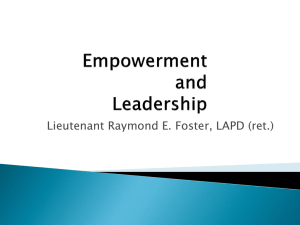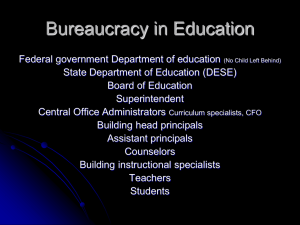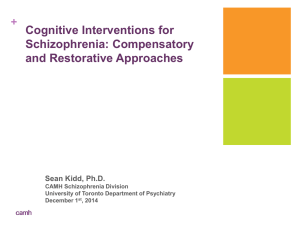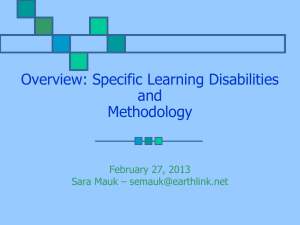New SPED PowerPoint Presentation
advertisement
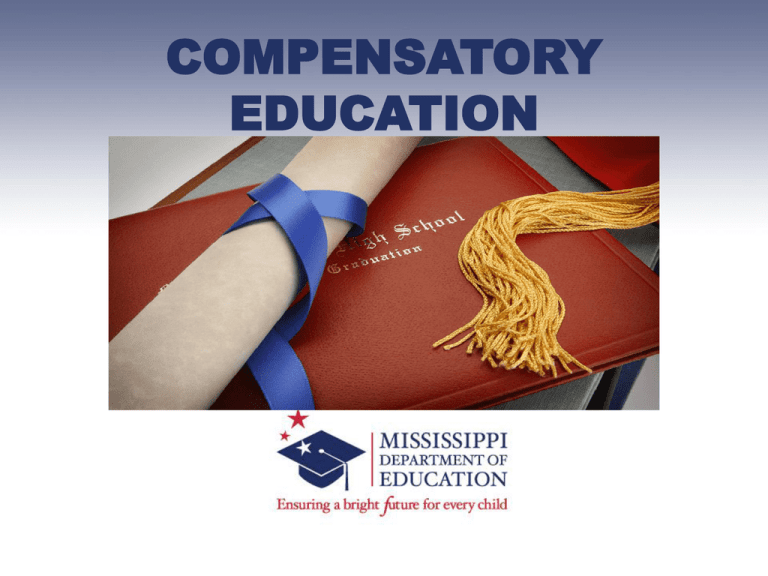
COMPENSATORY EDUCATION STATUTORY AUTHORITY (C) Additional requirements In any action brought under this paragraph, the court-(iii) basing its decision on the preponderance of the evidence, shall grant such relief as the court determines is appropriate. 20 U.S.C. §1415(i)(2)(C), 34 C.F.R. §300.516(c)(3) and Mississippi State Board Policy 7219 §300.516(c)(3). Sch. Comm. of the Town of Burlington, Mass. et al. v. Dep’t of Educ. of the Commonwealth of Mass., 471 U.S. 359, 105 S. Ct. 1996 (1985). The United States Supreme Court held that 20 U.S.C. §1415 authorizes reimbursement to parents of private school expenditures (1) if the Court ultimately determines that the public school failed to provide a FAPE and (2) the private school placement was appropriate. Id. at 369. The Statute directs the Court to “grant such relief as the Court determines is appropriate.” §1415(i)(2)(C)(iii). Sch. Comm. of the Town of Burlington, Mass. et al. v. Dep’t of Educ. of the Commonwealth of Mass., 471 U.S. 359, 105 S. Ct. 1996 (1985). The United States Supreme Court also held that a parental violation of §1415(e)(3) of the “stay put” and changing of the “then current educational placement” does not constitute a waiver of reimbursement. Id. at 372. To do so would go against the purpose of the Act; because the Act is intended to give handicapped children both an appropriate education and a free one. Id. Sch. Comm. of the Town of Burlington, Mass. et al. v. Dep’t of Educ. of the Commonwealth of Mass., 471 U.S. 359, 105 S. Ct. 1996 (1985). “We are confident that by empowering the court to grant ‘appropriate’ relief Congress meant to include retroactive reimbursement to parents as an available remedy in a proper case. In this Court, the Town repeatedly characterized reimbursement as ‘damages,’ but that simply was not the case. Reimbursement merely requires the Town to belatedly pay expenses that it should have paid all along and would have borne in the first instance had it developed a proper IEP.” WHAT TRIGGERS COMPENSATORY EDUCATION? Failure of an educational agency to provide a FAPE to a child with a disability as required by the IDEA. G v. Fort Bragg Dependent Schools, 343 F.3d 295, 309 (4th Cir. 2003). WHAT TRIGGERS COMPENSATORY EDUCATION? Any FAPE issues, such as: (1) Failure to timely identify/child find. See Miener v. Missouri, 800 F.2d 749 (8th Cir. 1986) and Compton Unified School District v. Addison, 598 F. 3d 1181 (9th Cir. 2010); (2) Failure to implement IEP. See Draper v. Atlanta Independent School System, 518 F.3d 1275 (11th Cir. 2008); (3) Failure to develop appropriate IEP. See Florence County School District Four v. Carter, 510 U.S. 7, 114 S.Ct. 361 (1993); OR (4) Failure to address behavior issues or for improperly disciplining a child with a disability. See B.H. v. West Clermont Board of Education, 788 F. Supp. 2d 682 (S.D. Ohio 2011). WHAT IS COMPENSATORY EDUCATION? Compensatory education involves discretionary, prospective, injunctive relief crafted by a court to remedy what might be termed an educational deficit created by an educational agency's failure over a given period of time to provide a FAPE to a student. The Fourth Circuit agreed with every circuit that had previously addressed the question that the IDEA permits an award of such relief in some circumstances. G. v. Fort Bragg Dependent Schools, 343 F.3d 295, 309 (4th Cir. 2003). WHAT IS COMPENSATORY EDUCATION? Educational services ordered by the court to be provided prospectively to compensate for a past deficient program—may be “appropriate relief” under the IDEA. G. v. Fort Bragg Dependent Schools, 343 F.3d 295, 308 (4th Cir. 2003) Ridgewood Bd. Of Educ. v. N.E., 172 F.3d 238, 249 (3d Cir. 1999)(recognizing appropriateness, in some circumstances, of award of compensatory education beyond age 21 remanding for determination of whether it should be awarded). WHAT IS COMPENSATORY EDUCATION? “An equitable remedy granted by the court as it finds appropriate.” Bd. Of Educ. Of Fayette Cty. Ky. v. L.M., 478 F.3d 307 (6th Cir. 2007). “Compensatory education is not an automatic entitlement but, rather, a discretionary remedy for nonfeasance or misfeasance in connection with a school system’s obligations under the IDEA.” C.G. v. Five Town Community Sch. Dist., 53 F.3d 279, 290 (1st Cir. 2008). PURPOSE OF COMPENSATORY EDUCATION “Compensatory education is meant to ‘place children in the position they would have been in but for the violation of the Act.’” Draper v. Atlanta Indep. School Sys., 480 F. Supp. 2d 1331 (N.D. Ga. 2007), aff’d 518 F.3d 1275 (11th Cir. 2008). See also B.H. v. West Clermont Board of Education, 788 F. Supp. 2d 682 (S.D. Ohio 2011). PURPOSE OF COMPENSATORY EDUCATION Compensatory education is “relief ordered pursuant to the IDEA and should be designed to ensure a free appropriate public education, not to compensate a personal injury.” Nieves-Marquez v. Puerto Rico, 353 F.3d 108, 125 (1st Cir. 2003). WHAT DO COMPENSATORY EDUCATION SERVICES LOOK LIKE? “As a discretionary equitable remedy, the extent of a compensatory education award is very dependent on the particular facts and circumstances of the case. The nature and extent of compensatory education services which federal courts have recognized arises according to the facts and circumstances of a given case. Such an award may include extra assistance in the form of tutoring, or summer school while students are still within the age of entitlement for regular services under the Act, or an extended period of assistance beyond the statutory age of entitlement.” Pihl v. Mass. Dept. of Educ., 9 F.3d 184, 188 n.8 (1st Cir. 1993); See also Millay v. Surry School Dept., 2011 WL 1122132, 56 IDELR 162 (D.Me. 2011). Florence County School District Four v. Carter, 510 U.S. 7, 114 S.Ct. 361 (1993) Courts may award reimbursement of private school tuition if the school district’s IEP was inappropriate under IDEA and the private school’s education was proper under IDEA even if the private school does not meet all of 20 U.S.C. §1401(a)(18)’s requirements because it cannot be read to apply to parental placements. Id. at 365. Forest Grove School District v. T.A., 557 U.S. 230, 129 S. Ct. 2484 (2009) The United States Supreme Court held that the “IDEA authorizes reimbursement for the cost of private special-education services when a school district fails to provide a FAPE and the private-school placement is appropriate regardless of whether the child previously received special education or related services through the public school.” Id. at 247. Forest Grove School District v. T.A., 557 U.S. 230, 129 S. Ct. 2484 (2009) “When a court or hearing officer concludes that a school district failed to provide FAPE and the private placement was suitable, it must consider all relevant factors, including the notice provided by the parents and the school district’s opportunities for evaluating the child in determining whether reimbursement for some or all of the cost of the child’s private education is warranted.” Id. at 247. Miener v. Missouri, 800 F.2d 749 (8th Cir. 1986) In this case, the school district failed to determine that child was eligible for IDEA services; and the parent could not afford a private placement and was forced to place child in the Youth Center of the St. Louis State Hospital for three years. Id. at 750. Recognizing appropriateness of compensatory education award and holding that plaintiff was entitled to recover compensatory education if she prevailed in her claim that she was denied a FAPE for several years. Id. at 753. Further, compensatory education services are available for future services to remedy the failure to provide FAPE in previous years and is not solely limited to retroactive financial reimbursement. Id. at 753. “We are confident that Congress did not intend the child’s entitlement to a free education to turn upon her parent’s ability to “front” its costs.” Id. at 753. Board of Education of Oak Park & River Forest High Sch. Dist. 200 v. Illinois State Board of Edu.,79 F.3d 654 (7th Cir. 1996) The IDEA's authorization to courts to grant “appropriate” relief “encompasses the full range of equitable remedies and therefore empowers a court to order adult compensatory education if necessary to cure a violation”. Id. at 656. “Except for the judge-created remedial exception for claims for compensatory education, the entitlements created by the IDEA expire when the disabled individual turns 21. The exception is where a claim for compensatory education is made. Compensatory education is a benefit that can extend beyond the age of 21.“ Id. at 660. Ferren C. v. School District of Philadelphia, 612 F.3d 712 (3rd Cir. 2010) In resolution of legal disputes, the school district agreed to set up a trust fund in excess of $200,000.00 to provide student with three years of compensatory education past 21st birthday. Id. at 715. Student attended an approved private school. Id. The school district declined to provide IEPs or serve as the LEA during the compensatory education period; however, the district court ordered it to do both. Id. at 716. The 3rd Circuit found that the court had the authority to award this type of specific non-monetary equitable relief and it was appropriate under IDEA based on the facts of the case. Id. at 718. Ferren C. v. School District of Philadelphia, 612 F.3d 712 (3rd Cir. 2010) If the relief furthers the purposes of the IDEA, then it is “appropriate”. Id. at 719. “A ‘money-only’ type of award for Ferren is exactly the type of empty victory that the Supreme Court sought to avoid in Burlington.” Id. at 71920. “Ferren was already deprived of a FAPE and by extension an IEP. Compensatory education is ‘a remedy to compensate for rights the district already denied.’ If an individual was deprived of their right to an adequate FAPE, and by extension an IEP, prior to the age of twentyone, it follows that the student could only be fully compensated by an award that contains the elements of a FAPE that she was previously denied. There is nothing in IDEA that evinces Congressional intent to limit courts’ equitable power to awards of only financial support. In certain cases, such as the one here, monetary awards cannot fully compensate a student for a school district’s past failures.” Id. Ferren C. v. School District of Philadelphia, 612 F.3d 712 (3rd Cir. 2010) The Third Circuit emphasized “that this specific type of equitable relief would only be granted on a case-by-case basis, depending on the specific situation of each student. In each case, a court will evaluate the specific type of relief that is appropriate to ensure that a student is fully compensated for a school district’s past violations of the student’s rights under IDEA and develop an appropriate equitable award. Further any additional litigation over the adequacy of the compensatory education can be minimized if the School District simply complies with the requirements of the IDEA.” Id. at 720. Draper v. Atlanta Independent School System, 518 F.3d 1275 (11th Cir. 2008) 1. The school district initially concluded that the student had an IQ of 63 in June of 1998 when the student was 11 years old. The initial evaluation consisted merely of an IQ test and failed to assess Draper for a specific learning disability even though he displayed signs of dyslexia, such as writing letters, numbers and words backwards. 2. Student was placed in self-contained classroom for children with mild intellectual disabilities from 1999 through 2003. 3. When the student was in the ninth grade and sixteen years old, he was re-evaluated in April 2003 and again in July 2003. His IQ was found to be 82. On Sept. 9, 2003 the school modified student’s diagnosis from mild intellectual disabilities to specific learning disability. 4. His reading and math skills in July 2003 were on a third-grade level. His spelling skills were on a second grade level. His reading level had not improved since April 2000. Draper v. Atlanta Independent School System, 518 F.3d 1275 (11th Cir. 2008) 5. He was placed in general education classes for the first time since third grade even though to survive academically in high school, a witness from the school testified he needed a fifth or sixth grade reading level. 6. The IEP provided he would use the Lexia program to improve his ability to read, but he was not provided the program. Even after the school system agreed during mediation that he would receive the program no later than November 21, 2003, he did not receive the program until December 9, 2003. 7. By January 12, 2004 he had received only 2.5 hours of instruction with the Lexia program. 8. The school’s own expert in the summer of 2004 found student’s skills severely discrepant from his potential, that he suffered from a SLD consistent with dyslexia and recommended intensive multi-sensory training to remedy academic deficits. 9. The IEP team decided to continue the use of the Lexia program despite the objections by the parents that it was inadequate to meet his needs. Draper v. Atlanta Independent School System, 518 F.3d 1275 (11th Cir. 2008) The court enjoys broad discretion in fashioning an appropriate equitable relief for a student when determining compensatory education services. Id. at 1285-86. The 11th Circuit affirmed the district court’s determination that the school district failed to provide the student a FAPE for three school years. The Court also affirmed as appropriate the student’s placement at a private school including the supplemental services as outlined by student’s doctor totaling $34,150.00 a year through 2011 or when the student receives a high school diploma. Id. at 1283-84. Draper v. Atlanta Independent School System, 518 F.3d 1275 (11th Cir. 2008) The 11th Circuit found that, “An award of compensation for a violation of the Act is different from the educational program ordinarily required by the Act. An educational program must be ‘reasonably calculated to enable the child to receive educational benefits.’ (citations omitted.) “[W]hen measuring whether a handicapped child has received [adequate] educational benefits...courts must only determine whether the child has received the basic floor of opportunity.” (citations omitted.) If there has been a violation, the district court may award “appropriate” compensatory relief. (citations omitted.) Although “ordinary [educational programs] need only provide ‘some benefit,’ compensatory awards must do more—they must compensate.” Reid ex rel. Reid v. District of Columbia, 401 F.3d 516, 525 (D.C.Cir.2005). Compensatory awards should place children in the position they would have been in but for the violation of the Act. Reid v. District of Columbia, 401 F.3d 515 (D.C. Cir. 2005) The Court found that the IEP was inappropriate and denied the student a FAPE for four-and-ahalf years. Id. at 520. “We hold that compensatory education awards fit comfortably within the ‘broad discretion’ of courts fashioning and enforcing IDEA remedies.” Id. at 523. We agree that “there is no obligation to provide a day-for-day compensation for time missed. Appropriate relief is relief designed to ensure that the student is appropriately educated within the meaning of the IDEA.” Id. at 524. Thus, the need for flexibility and to consider the unique needs of the child. Id. Reid v. District of Columbia, 401 F.3d 515 (D.C. Cir. 2005) The Court further found that “while an ordinary IEP need only provide ‘some benefit,’ compensatory awards must do more-they must compensate.” Id. at 525. If anything, the district court should have required the school district to offer proof that the placement at Accotink Academy compensated for prior FAPE denials in addition to providing some benefit going forward. Id. Reid v. District of Columbia, 401 F.3d 515 (D.C. Cir. 2005) “The hearing officer may not delegate his authority to a group that includes an individual specifically barred from performing the hearing officer’s functions…The Order is meant to be final; therefore the award is binding on the parties absent a new hearing.” Id. at 526-27. Board of Education of Fayette County, Kentucky v. T.D., 478 F.3d 307 (6th Cir. 2007) The Sixth Circuit found that T.D. was denied a FAPE for two years plus one summer. The Sixth Circuit felt a flexible approach rather than rote hour-by-hour compensation award, was more likely to address T.D.’s educational problems successfully; therefore, it upheld the district court’s reversal of the 125 compensatory hours and declined to implement the parents’ requested hour for hour. The Court noted that T.D. may well need more than 125 hours. However, we hold that neither a hearing officer nor an Appeals Board may delegate to a child’s IEP team power to reduce or terminate a compensatory education award. The Court remanded the case with instructions to award a remedy consistent with opinion. Millay v. Surry School Department, 2011 WL 1989923, 56 IDELR 257, 111 LRP 37001 (D.Me. 2011) The Court awarded 86 weeks of compensatory education for student, and developing and implementing those services. The Court found that “although the idea of a compensatory education trust fund is not completely out of the question, that allowing a parent to decide how to use limited public education dollars creates its own set of problems. Specifically, the court might be forced to step in and determine whether the services selected by the parent were appropriate. This would place the court precisely in a position it should not occupy—the position of setting educational policy and dictating future programming decisions.” Heather D. v. Northampton Area Sch. Dist., 511 F. Supp. 2d 549 (E.D. Penn. 2007) The Court noted that the Third Circuit in discussing the right to compensatory education, has stated that where such an award is appropriate, the “disabled child is entitled to compensatory education for a period equal to the period of deprivation.” Therefore, an award of compensatory education ties to services denied in the past, rather than a corrective approach designed to help the student perform in accordance with some speculated potential. Id. at 557. Heather D. v. Northampton Area Sch. Dist., 511 F. Supp. 2d 549 (E.D. Penn. 2007) The Court found the following: (1) the statute of limitations does not bar Heather’s claim for compensatory education for her first, second and third grade years (96-99); (2) the school district denied her a FAPE for her first through eighth grade school years (96-04); (3) the appropriate remedy for the denial of FAPE for the first through sixth grades is 10 hours per week of compensatory education services for 1,860 hours; (4) the appropriate remedy for the denial of FAPE for the seventh grade is 460 hours and 108 hours for eighth grade; (5) $75.00/hour at 2,428 hours = $182,100.00 compensatory education award; (6) the parents may decide how the hours should be spent so long as they take the form of any appropriate developmental, remedial, or enriching instruction that furthers the IEP goals. Westendorp v. Independent School District No. 273, 35 F.Supp. 2d 1134 (D.C. D.Minn. 1998) The Eighth Circuit held that ISD No. 273 violated Aaron’s rights under IDEA by denying him a paraprofessional at Calvin Christian School and remanded the case back to the District Court for a determination of the proper scope of relief. Peter v. Wedl, 155 F.3d 992, 1001 (8th Cir. 1998). On remand, Independent School District No. 273 was ordered to provide a classroom paraprofessional aide to Aaron Westendorp at the school chosen by his parents, whether public or private (including religious), the equivalent of six academic years. Id. at 1138. NOTE: that these services were only available at a private school through the 1996-1997 school year because of Congress’ 1997 amendments to IDEA. Gill v. District of Columbia, 751 F.Supp.2d 104 (D.C. 2010) The Court found that student was denied FAPE; however, parent provided insufficient evidence for the court determine the appropriate compensatory education services. The Court found that W.G. could not read and needed to be taught basic like-skills such as recognizing letters and crossing the street on signal, yet sat in Algebra and Chemistry which provided no benefit to the student with a 51 IQ. However, the court sits in equity and may hear additional evidence and invited the parents to request an evidentiary hearing to determine compensatory services. The education of a special needs child cannot be forfeited by lawyering when the facts and needs of the child are clearly revealed in the record. C.G. v. Five Town Community Sch. Dist., 53 F.3d 279, 290 (1st Cir. 2008). The district court found that the parents' actions disrupted the IEP process, stalling its consummation and preventing the development of a final IEP. Moreover, the court found, the parents did so despite their knowledge that the School District planned to complete the unfinished portions with the parents' help. Tellingly, the court determined that the cause of the disruption was the parents' single-minded refusal to consider any placement other than a residential one. Such actions, whether or not wellintentioned, constitutes an unreasonable approach to the collaborative process envisioned by the IDEA. Here, that attitude sufficed to undermine the process. Their unreasonable obstruction of an otherwise promising IEP process fully justifies a denial of reimbursement under the IDEA. Letter to Anonymous, 21 IDELR 1061, 21 LRP 2775 (August 29, 1994). “OSEP’s position has been that compensatory education is an appropriate means for providing a FAPE to a child with disabilities who has previously been denied FAPE. In certain instances, compensatory education may be the only means through which children who are forced to remain in an inappropriate placement, due to their parents’ financial inability to pay for an appropriate placement, would receive FAPE. Both the State Educational agency (SEA) and an impartial due process hearing officer has the authority to require compensatory education if it is required to provide FAPE to a child with disabilities who has been denied FAPE. With respect to the obligation of a SEA or LEA to provide remediation for educational performance, Part B of the IDEA does not require remediation as a part of providing FAPE to a child. ” See also Letter to Kohn, 17 IDELR 522, 17 LRP 1319 (Feb. 13, 1991). Letter to Kohn, 17 IDELR 522, 17 LRP 1319 (Feb. 13, 1991). Compensatory education is an appropriate method for providing FAPE to a child with disabilities for whom FAPE has been previously denied. Compensatory education may be the only means through which children who are forced to remain in an inappropriate placement due to their parents’ financial inability to pay for an appropriate private placement would receive a FAPE. Though Part B does not address the specific remedies that an impartial hearing officer may order upon a finding that a child has been denied a FAPE, OSEP’s position is that, based upon the facts and circumstances of each individual case, an impartial hearing officer has the authority to grant any relief they deem necessary, inclusive of compensatory education, to ensure that a child receives the FAPE to which they are entitled. The scope of compensatory education ordered in an impartial hearing officer’s decision must be consistent with a child’s entitlement to FAPE, but should not impose obligations that would go beyond entitlement. Therefore, a hearing officer who concludes that a child with disabilities is entitled to compensatory education may order, as a means of redressing the denial of FAPE to that child, that compensatory education include or take the form of summer school programming. Letter to Riffel, 33 IDLER 188 (2000) In OSEP’s opinion, if it is determined that a student is eligible for compensatory education, then the student is entitled to those services to remedy a past denial of FAPE. Even if the student graduates with a regular high school diploma, the student cannot be required to delay graduation in order to receive the services. HEATHER S. DEATON OFFICE OF THE MISSISSIPPI ATTORNEY GENERAL COUNSEL TO THE MISSISSIPPI DEPARTMENT OF EDUCATION OFFICE OF SPECIAL EDUCATION
